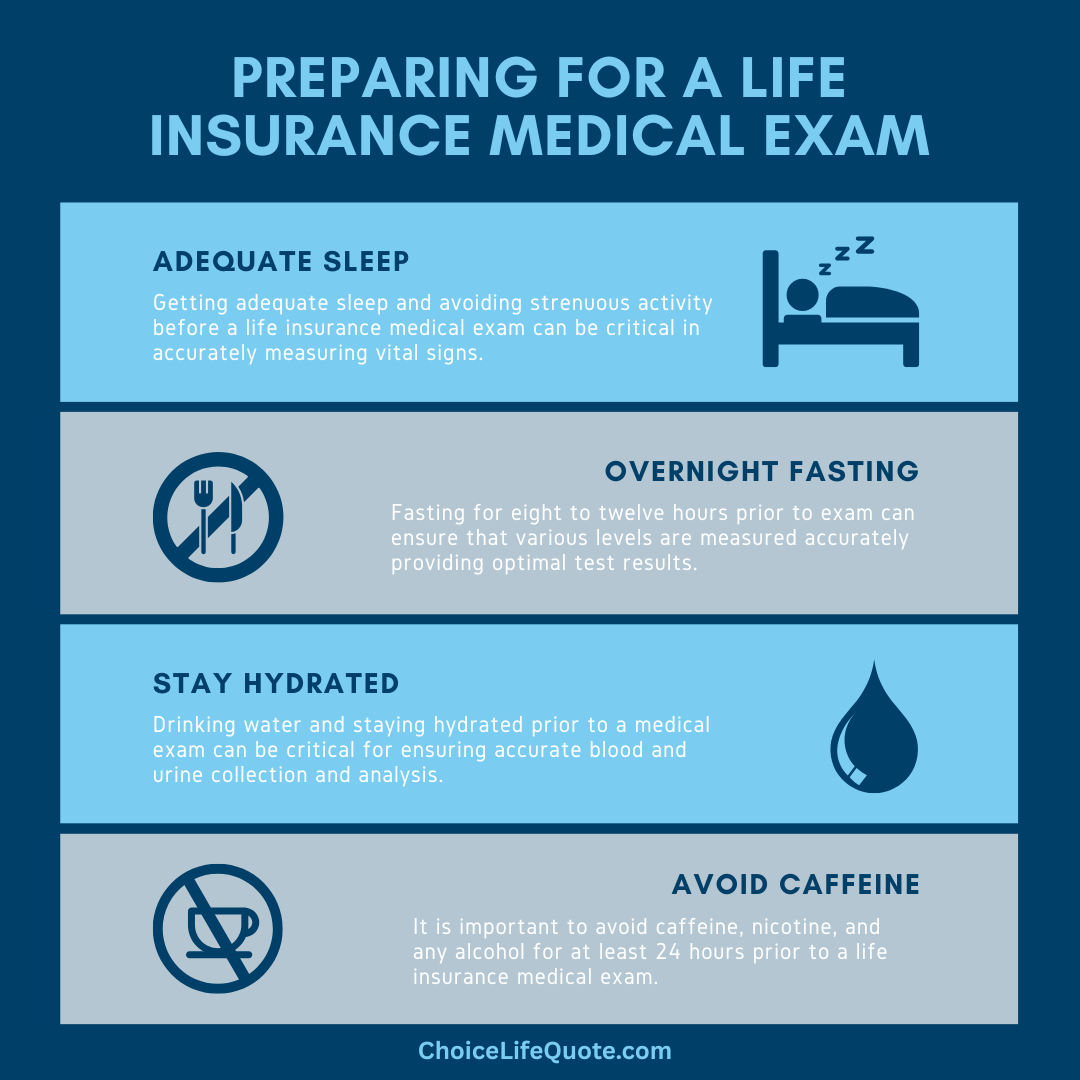How to Prepare for a Life Insurance Medical Exam

Are you considering purchasing life insurance, but are feeling anxious about the medical exam? Don't worry, you're not alone. Many people find the thought of a medical exam intimidating, but it doesn't have to be. In fact, with a little preparation, you can optimize your chances of passing the exam with flying colors.
This article provides insight and best practices for preparing for a life insurance medical exam, ensuring that you are well-prepared and confident, whether you're a health-conscious individual or have pre-existing conditions.
Life Insurance Medical Examinations
Life insurance medical exams play a crucial role in the underwriting process. Insurers use these exams to assess your current health condition and determine the risk associated with approving your coverage.
The results of the medical exam can help insurers determine your policy premium rates and overall coverage options.

By undergoing a medical exam, you are providing the insurer with the necessary information to make an informed decision about insuring you and setting appropriate rates.
A life insurance policy helps protect your loved ones financially in the event of an untimely death. It provides a lump sum payment that can be used to cover funeral expenses, outstanding debts, mortgage payments, and even your children’s educational expenses. By preparing for the life insurance medical exam, you increase your chances of obtaining an affordable policy that adequately meets your family’s needs.
What to Expect During the Life Exam
It’s natural to feel anxious about the unknown, especially when it comes to medical exams. However, knowing what to expect can help alleviate some of your concerns. Life insurance medical exams are typically conducted by licensed healthcare professionals, such as nurses or paramedics. They are designed to gather information about your health and lifestyle, ensuring that insurers have a comprehensive understanding of your risk profile.
During the exam, the healthcare professional will ask you a series of questions about your medical history, including any pre-existing conditions, surgeries, and medications you may be taking. They will also measure your height, weight, blood pressure, and pulse rate. Additionally, you may be required to provide a blood and urine sample for further analysis. The entire process usually takes around 30-60 minutes and can be conducted in the comfort of your own home or at a designated testing center.
Preparing for a Life Insurance Exam
Preparing for a life insurance medical exam involves a combination of lifestyle considerations and gathering necessary documents. By following these tips, you can ensure that you are well-prepared and confident on the exam day.
Good Sleep: Getting a good night's sleep and avoiding strenuous activity before your exam can be critical for accurate measurements of your blood pressure, pulse rate, and other vitals.
Fasting Prior: Fasting for eight to twelve hours prior to your life insurance exam can ensure that cholesterol and glucose levels are measured accurately and support optimal laboratory results.
Hydrate Well: Drink adequate water and stay properly hydrated prior to your life insurance medical exam can be critical for ensuring accurate blood and urine sample collection and analysis.
Avoid Caffeine: It’s important to avoid nicotine, alcohol, and caffeine products for at least 24 hours prior to your life insurance exam, to ensure accurate readings of blood pressure, pulse rate, and other vitals.

Tips for Successful Insurance Exam
While the life insurance medical exam is designed to assess your health, there are several steps you can take to improve your results and maximize your chances of securing favorable rates.
Tip 1: Follow a Healthy Lifestyle - Adopting a healthy lifestyle can significantly impact your overall health and well-being. Incorporate regular exercise, eat a balanced diet, avoid smoking, and limit alcohol consumption. These lifestyle choices can help improve your overall health and lower the risk factors assessed during the medical exam.
Tip 2: Manage Stress Levels - Chronic stress can have a detrimental impact on your health. Implement stress management techniques such as meditation, exercise, and engaging in hobbies to keep stress levels in check. By managing stress effectively, you can improve your overall well-being and potentially lower your blood pressure.
Tip 3: Be Honest and Thorough - When answering questions during the medical exam, be honest and thorough. Providing accurate information about your medical history, lifestyle, and any pre-existing conditions is crucial for insurers to assess your risk accurately. Failing to disclose relevant information can lead to complications during the underwriting process and potentially result in denied claims.
Tip 4: Review Medical Records - Before the exam, review your medical records and ensure that all information is accurate and up to date. This includes any recent surgeries, medications, or treatments you may have undergone. By being proactive, you can ensure that the information provided to the insurer is complete and accurate.
Tip 5: Relaxation Techniques - If you experience anxiety or nervousness during medical exams, practice relaxation techniques such as deep breathing exercises or visualization. These techniques can help calm your mind and body, allowing for a more relaxed experience during the exam.
Information & Documents Required
Documents and information to gather before the exam to ensure a smooth and efficient life insurance medical exam, gather the following documents and information beforehand:
- Identification documents (e.g., driver’s license, passport)
- List of current medications, including dosages and frequency
- Medical history, including previous hospitalizations or ongoing treatments
- Family medical history (e.g., parents, siblings)
- Insurance policy information, if applicable
- Contact details of your primary care physician or any specialists
- Any relevant medical test results (e.g., blood work, imaging reports)
Having these documents readily available on the day of the exam will help streamline the process and ensure accurate information is provided to the healthcare professional conducting the exam.
Common Medical Tests Conducted
Life insurance medical exams may include various tests and measurements to assess your overall health.
The life insurance company uses this information and a standardized underwriting process to formally evaluate your application for life insurance coverage. Here are some of the common tests conducted and additional requirements during the exam:

- Height and Weight: These measurements help calculate your body mass index (BMI) and assess your overall weight status.
- Blood Pressure: Blood pressure is a vital sign used to assess cardiovascular health. It measures the force of blood in your arteries and can indicate potential health risks.
- Pulse Rate: The pulse rate measures your heart rate and rhythm. It helps assess your cardiovascular health and can provide insights into your overall fitness level.
- Blood & Urine: These samples are collected to evaluate various health markers such as cholesterol levels, glucose levels, liver function, kidney function, and the presence of any underlying medical conditions or diseases.
- EKG/ECG: An electrocardiogram (EKG or ECG) measures the heart's electrical activity. It helps detect any abnormalities in heart rhythm or potential cardiac conditions.
- Additional Tests: Depending on your age, medical history, and coverage amount you are applying for, additional tests may be required. These can include but are not limited to imaging tests (e.g., X-rays, ultrasounds), stress tests, or genetic testing.
Addressing Pre-Existing Conditions
If you have pre-existing conditions, it’s important to handle them appropriately during the life insurance medical exam. Here are some tips to consider:
Be transparent about your conditions. Ensure that you provide accurate and detailed information about your pre-existing conditions during the exam. Disclose any diagnoses, treatments, and medications you are currently taking. This will help the insurer assess your risk accurately and provide appropriate coverage options.
Provide supporting documentation. If you have medical records or reports related to your pre-existing condition, gather and provide them to the insurer. These documents can provide additional insights into your condition and help the underwriter make a more informed decision.
Follow existing treatment plans. Adhere to your physician’s recommendations and treatment plans for your pre-existing condition. This shows your commitment to managing your health and can positively influence the underwriting process.
Understand coverage limitations. Depending on the severity of your pre-existing condition, certain coverage limitations or exclusions may apply. It’s important to understand these limitations and review the policy terms before making a decision.
Work with an independent broker. If you have complex pre-existing conditions, consider working with an independent insurance broker who has experience in placing coverage for individuals with similar conditions. They can help navigate the underwriting process and find insurers who are more likely to provide coverage given your specific circumstances.
What to Expect After the Exam
Once the life insurance medical exam is complete, the results are sent to the insurer for review. The underwriting process typically involves analyzing your medical exam results, medical records, and other relevant information to assess your risk profile.
Based on the evaluation, the insurer will determine your premium rates, coverage options, and any necessary exclusions or limitations. In some cases, further medical information or tests may be requested to clarify certain aspects of your health or to obtain a more accurate risk assessment.
Once the underwriting process is complete, the insurer will provide you with the details of your policy, including the coverage amount, premium rates, and any additional terms or conditions. It’s important to review the policy thoroughly and ask any questions you may have before accepting the offer.
In the event that your application is declined or the offered terms are not suitable, you may explore alternative insurance options or work with an independent broker to find coverage that meets your needs.
Conclusion
In conclusion, preparing for a life insurance medical exam may seem daunting, but with the right mindset and proper preparation, you can optimize your chances of success. By following the tips outlined above and adopting a healthy lifestyle, you can improve your overall health and potentially secure more favorable rates. Remember, the purpose of the life insurance medical exam is to provide insurers with accurate information to assess your risk accurately. Be honest, provide complete information, and take the necessary steps to ensure a smooth and efficient exam process.
Our team can assist in choosing the right type of policy, an appropriate amount of coverage, and the best insurance company for your individual situation. Get quality coverage at affordable rates. Give us a call at (800) 770-8229, or request an instant quote today!
Disclaimer: Information is intended to be educational in nature and should not be considered financial, tax, or legal advice. Please consult a qualified professional for individual assistance.
The Staff Writers at ChoiceLifeQuote.com are insurance and financial services professionals with significant industry experience. The team’s experience and expertise help to provide consumers with a variety of educational content related to life insurance and annuities.


